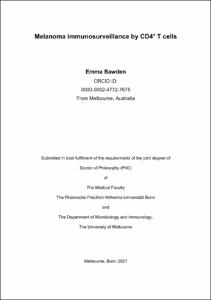Melanoma immunosurveillance by CD4+ T cells

Melanoma immunosurveillance by CD4+ T cells

| dc.contributor.advisor | Hölzel, Michael | |
| dc.contributor.author | Bawden, Emma | |
| dc.date.accessioned | 2021-07-05T08:01:33Z | |
| dc.date.available | 2023-07-15T22:00:15Z | |
| dc.date.issued | 05.07.2021 | |
| dc.identifier.uri | https://hdl.handle.net/20.500.11811/9196 | |
| dc.description.abstract | The immune system can recognise and control cancer cells in a process termed cancer immunosurveillance. There is increasing evidence that CD4+ T cells play an important role in melanoma immunosurveillance but considerable debate surrounds the underlying anti-tumoral mechanisms. This project thus sought to unravel the role of CD4+ T cell responses to melanoma using a transplantable orthotopic murine melanoma model in conjunction with newly generated genetically modified B16 melanoma cell lines. Remarkably, adoptive transfer of naïve or activated antigen-specific CD4+ T cells was highly protective against the development of melanoma. In addition to a classical “helper” function, CD4+ T cells acted as peripheral anti-tumoral effector cells whereby they migrated into the skin, differentiated into Th1 cells and mediated local suppression of tumor development. Accordingly, we provide evidence that CD4+ T cells can directly kill melanoma cells in vitro through several cytotoxic pathways, including TNF superfamily signalling via TNF? and FasL as well as perforin-dependent cell lysis. Finally, we investigated the role of MHC-II expression by melanoma on the antitumoral function of CD4+ T cells. Whilst MHC-II expression by melanoma cells promoted CD4+ T cell infiltration into the primary tumor site it was dispensable for control mediated by CD4+ T cells. This suggested an important role for indirect display of MHC-II-restricted epitopes by antigen-presenting cells within the tumor microenvironment. This was supported by visualization of melanoma-specific CD4+ T cells in the tumor microenvironment using two-photon microscopy, where activated CD4+ T cells appeared to interact with melanoma cells via intermediary cells, presumably professional antigen-presenting cells. Finally, we observed a reduction in metastatic lesions in the tumor-draining lymph node in mice challenged with MHC-II deficient melanoma cells. These data suggest that MHC-II may play context-dependent roles in control of primary tumors and lymph node metastases by CD4+ T cells. In summary, this study demonstrates the important role of CD4+ T cells in melanoma immunosurveillance and provides important insights into underlying antitumoral mechanisms. | en |
| dc.language.iso | eng | |
| dc.rights | In Copyright | |
| dc.rights.uri | http://rightsstatements.org/vocab/InC/1.0/ | |
| dc.subject.ddc | 610 Medizin, Gesundheit | |
| dc.title | Melanoma immunosurveillance by CD4+ T cells | |
| dc.type | Dissertation oder Habilitation | |
| dc.publisher.name | Universitäts- und Landesbibliothek Bonn | |
| dc.publisher.location | Bonn | |
| dc.rights.accessRights | openAccess | |
| dc.identifier.urn | https://nbn-resolving.org/urn:nbn:de:hbz:5-62209 | |
| ulbbn.pubtype | Erstveröffentlichung | |
| ulbbnediss.affiliation.name | Rheinische Friedrich-Wilhelms-Universität Bonn | |
| ulbbnediss.affiliation.location | Bonn | |
| ulbbnediss.affiliation.otherLocation1 | Melbourne | |
| ulbbnediss.affiliation.otherName1 | University of Melbourne | |
| ulbbnediss.thesis.level | Dissertation | |
| ulbbnediss.dissID | 6220 | |
| ulbbnediss.date.accepted | 03.05.2021 | |
| ulbbnediss.institute | Medizinische Fakultät / Institute : Institut für Experimentelle Onkologie | |
| ulbbnediss.fakultaet | Medizinische Fakultät | |
| dc.contributor.coReferee | Gebhardt, Thomas | |
| dcterms.hasSupplement | https://doi.org/10.22000/459 | |
| ulbbnediss.contributor.orcid | https://orcid.org/0000-0002-4772-7675 | |
| ulbbnediss.date.embargoEndDate | 15.07.2023 | |
| ulbbnediss.contributor.gnd | 1249132274 |
Dateien zu dieser Ressource
Das Dokument erscheint in:
-
E-Dissertationen (1904)




